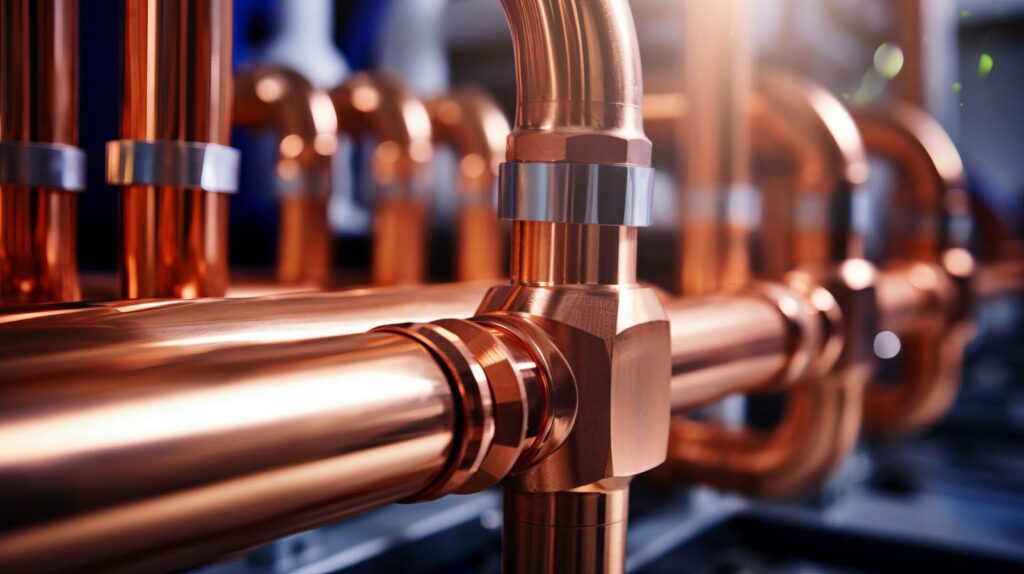They say that ‘a stitch in time saves nine.’ When it comes to your plumbing system, this old adage holds true. You rely on your pipes every day to deliver clean water and remove waste from your home, so it’s crucial to ensure that they are durable and dependable.
But how can you ensure the longevity of your plumbing system? In this discussion, we will explore the different types of durable pipes available, the benefits of using long-lasting materials, factors to consider when choosing pipes, proper installation techniques, maintenance tips, and common issues that may arise.
By the end, you will have a comprehensive understanding of how to ensure the durability of your pipes and maintain a reliable plumbing system.
Key Takeaways
- Copper, PEX, PVC, and stainless steel pipes are durable options for plumbing systems, offering resistance to corrosion, longevity, and versatility.
- Long-lasting plumbing materials provide numerous benefits, including extended lifespan, cost-effectiveness, sustainability, and prevention of leaks and repairs.
- Regular maintenance is crucial for prolonging pipe lifespan, preventing corrosion, ensuring reliability, saving money, and promoting peace of mind.
- Inspection, cleaning, proper drain usage, dealing with hard water, and addressing common pipe issues are essential practices for maintaining durable plumbing systems.
Types of Durable Pipes
When it comes to ensuring a reliable plumbing system, it’s crucial to choose durable pipes that can withstand the test of time. There are various pipe materials available, each offering different levels of resistance to corrosion. Let’s explore some of the most popular options.
One common type of durable pipe is copper. Known for its excellent resistance to corrosion, copper pipes are long-lasting and have been used in plumbing systems for many years. They’re also known for their versatility and can be easily bent and manipulated to fit different layouts.
Another popular choice is PEX (cross-linked polyethylene) pipes. These pipes are highly durable and resistant to corrosion, making them an excellent option for both residential and commercial plumbing systems. PEX pipes are flexible, allowing for easy installation and reducing the risk of leaks.
For those looking for a more affordable option, PVC (polyvinyl chloride) pipes are a great choice. While they may not have the same level of resistance to corrosion as copper or PEX pipes, PVC pipes are still highly durable and can last for many years. They’re commonly used for drainage and waste systems.
Lastly, stainless steel pipes are ideal for areas with high levels of corrosion, such as coastal regions. They’re incredibly resistant to corrosion and can withstand extreme temperatures, making them a reliable choice for plumbing systems in harsh environments.
Benefits of Long-Lasting Plumbing Materials
When it comes to choosing plumbing materials, durability is key.
Long-lasting plumbing materials offer numerous benefits for homeowners.
They provide extended lifespans, ensuring that your plumbing system will last for years to come.
Additionally, investing in durable pipes and materials can be cost-effective in the long run, as they require fewer repairs and replacements.
Durability of Materials
Long-lasting plumbing materials provide homeowners with reliable and durable pipes for their plumbing systems. By using sustainable materials, these pipes not only ensure long-term functionality but also have a positive environmental impact.
Sustainable materials, such as copper or PEX (cross-linked polyethylene), are designed to withstand the test of time, reducing the need for frequent replacements. This reduces the overall waste generated and conserves natural resources. Additionally, these materials are resistant to corrosion and degradation, preventing leaks and costly repairs.
With durable plumbing materials, you can have peace of mind knowing that your plumbing system will remain efficient and dependable for years to come. Join the community of homeowners who prioritize sustainability and enjoy the benefits of long-lasting plumbing materials.
Extended Lifespan Advantages
By choosing durable plumbing materials, you can enjoy numerous advantages and benefits that come with their extended lifespan. The longevity benefits of using sustainable materials in your plumbing system are undeniable. Not only do these materials withstand the test of time, but they also reduce the need for frequent repairs and replacements, saving you both time and money in the long run.
With durable pipes, you can have peace of mind knowing that your plumbing system will remain reliable and efficient for years to come. Additionally, sustainable materials promote environmental conservation by reducing waste and minimizing the need for resource-intensive manufacturing processes.
Cost-Effective Investment
Investing in durable plumbing materials proves to be a cost-effective choice, providing long-term savings and peace of mind. When it comes to your plumbing system, you want affordable options that will last for years to come.
Here are three reasons why choosing long-lasting plumbing materials is a smart investment:
- Reduced repair and replacement costs: Durable pipes and fixtures are less likely to leak or break, saving you money on frequent repairs or replacements.
- Energy efficiency: High-quality plumbing materials can improve the efficiency of your water system, reducing your water and energy bills in the long run.
- Increased property value: A reliable plumbing system adds value to your home, making it an attractive option for potential buyers.
Factors to Consider When Choosing Pipes
What factors should you consider when selecting pipes for your plumbing system? Choosing the right pipes for your plumbing system is crucial to ensure its durability and reliability. There are several factors that you should take into consideration, such as material selection and environmental impact.
Material selection plays a significant role in determining the longevity and performance of your plumbing system. Different materials have different properties and strengths, so it’s essential to choose pipes that are suitable for your specific needs. Here are some commonly used materials for plumbing pipes:
| Material | Pros | Cons |
|---|---|---|
| Copper | Durable and corrosion-resistant | Expensive and requires skilled installation |
| PVC | Affordable and easy to install | Not suitable for hot water applications |
| PEX | Flexible and resistant to freezing | Requires special tools for installation |
| Galvanized | Corrosion-resistant and long-lasting | Prone to rust and can reduce water flow |
Aside from material selection, it’s also important to consider the environmental impact of the pipes you choose. Some materials may have a higher carbon footprint or contribute to water pollution during production or disposal. Opting for environmentally friendly options, such as recycled or sustainable materials, can help minimize the impact on the planet.
Proper Installation Techniques for Reliable Systems
To ensure a reliable plumbing system, proper installation techniques are essential. It’s not just about choosing the right pipes but also about ensuring that they’re installed correctly. Here are some installation best practices to consider:
- Hire a professional: When it comes to installing your plumbing system, it’s important to hire a professional plumber. They have the knowledge and expertise to ensure that the installation is done correctly. Plus, they’ll be able to handle any unforeseen issues that may arise during the process.
- Follow manufacturer guidelines: Each pipe and fitting has specific installation instructions provided by the manufacturer. It’s crucial to follow these guidelines to ensure that the pipes are installed properly. This includes using the right tools, techniques, and materials. By following the manufacturer’s instructions, you can avoid potential leaks and other plumbing issues.
- Test the system: Once the installation is complete, it’s important to test the plumbing system to ensure that everything is working correctly. This includes checking for leaks, proper water flow, and drainage. Testing the system will help identify any issues that need to be addressed before they become major problems.
Professional installation is of utmost importance when it comes to your plumbing system. Not only does it ensure that the installation is done correctly, but it also provides peace of mind knowing that your plumbing system is reliable and durable.
Maintenance Tips for Prolonging Pipe Lifespan
Regular maintenance is crucial for extending the lifespan of your pipes and ensuring a reliable plumbing system. By following a few simple maintenance tips, you can prevent pipe corrosion and keep your plumbing system in top shape.
Firstly, make sure to regularly inspect your pipes for any signs of corrosion or damage. Look for discoloration, rust, or leaks, as these can indicate that your pipes are corroding. If you notice any issues, it’s important to address them promptly to prevent further damage.
In addition to regular inspections, cleaning your pipes is an important part of maintenance. Over time, mineral deposits and debris can accumulate in your pipes, leading to corrosion. To prevent this, use a pipe cleaning solution or vinegar to flush out any build-up. This will help keep your pipes clear and prevent corrosion.
Another important maintenance tip is to be mindful of what you put down your drains. Avoid pouring harsh chemicals or grease down your drains, as these can cause corrosion and clogs. Instead, dispose of these substances properly and use drain screens to catch any debris before it enters your pipes.
Lastly, consider investing in a water softener if you live in an area with hard water. Hard water contains high levels of minerals, which can accelerate pipe corrosion. A water softener will help remove these minerals, protecting your pipes and prolonging their lifespan.
Common Issues and Solutions for Pipe Durability
One key aspect of maintaining pipe durability is addressing common issues that may arise. Proper pipe maintenance is essential to ensure the longevity of your plumbing system. Here are some common pipe problems and their solutions to help you maintain durable pipes:
- Leaky Pipes: Leaks can occur due to various reasons, such as corrosion, high water pressure, or improper installation. Regularly inspect your pipes for any signs of leaks, such as water stains or dampness. If you find a leak, it’s important to fix it promptly to avoid further damage. Depending on the severity of the leak, you may need to tighten the connections, replace a section of the pipe, or seek professional assistance.
- Clogged Drains: Clogs can disrupt the flow of water through your pipes, leading to backups and potential damage. To prevent clogs, avoid disposing of grease, hair, or other debris down the drain. Regularly flush your drains with hot water and use a plunger or drain cleaner to remove minor clogs. If the clog persists, consider contacting a professional plumber who can use specialized tools to clear the blockage.
- Frozen Pipes: In colder climates, frozen pipes can be a common issue, leading to pipe bursts and costly repairs. To prevent frozen pipes, insulate them properly and keep your home well-heated during freezing temperatures. If you suspect a frozen pipe, turn off the water supply and use a hairdryer or heat gun to thaw the pipe slowly. It’s crucial to avoid using open flames or excessive heat, as this can damage the pipe.
Summary
Choosing durable pipes for your plumbing system is essential for ensuring a dependable and long-lasting system.
By considering factors such as material, installation techniques, and maintenance, you can prolong the lifespan of your pipes and avoid common issues.
Investing in high-quality pipes will save you time and money in the long run, providing you with peace of mind and reliable plumbing for years to come.

